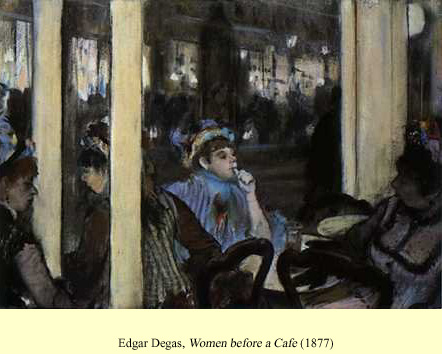Charles Baudelaire
The Eyes of the Poor
(Translated by Michael Hoke)
Many of the
works of poet Charles Baudelaire deal directly or indirectly with the
transformation of Paris in the 1850s and 1860s. As you read the prose
poem below, think about the ways that these changes made possible the
scence described below and how it reflects the experience of the new
city. |
|---|
Ah! you would like to know why I hate you today. It will no doubt be
harder for you to understand than for me to explain it to you; as you
are, I believe, the most perfect example of feminine impermeability that
one could encounter.
feminine impermeability that
one could encounter.
We had just passed a long day together that appeared short to me. We had each sworn that all our thoughts would be common to the both of us, and that our two souls would nevermore do anything, but as one;—a dream that has nothing original in it, after all, except that, dreamt by all men, it has been realized by none.
That evening, a bit tired, you wanted to sit outside in front of the new café on the corner of the new boulevard, still covered in rubble but already showing gloriously its unfinished splendors. The café sparkled with light. The gas lamps themselves radiated all the warmth of a new day, and with all their strength brightened the blinding white walls, the dazzling faces of the mirrors, the gilded mouldings and cornices, the errand-boys with chubby cheeks trailing behind their leashed dogs, the ladies laughing at the falcons perched on their fists, the nymphs and goddesses carrying on their heads fruits, pâtés and game meats, the Hebes and Ganymedes presenting with outstretched arms a little amphora of Bavarian cream or a two-toned obelisk of a selection of ices; all history and all mythology put into service of gluttony.
Just in front of us, on the roadway, was planted a brave man of some forty years, with a weary face, a grizzled beard, holding the hand of a little boy and carrying in his other arm a small child too weak to walk. He was playing the nanny and taking his children out for some evening air. All in rags. These three faces were extraordinarily serious, and these six eyes fixedly contemplated the new café with equal admiration, though varying in expression according to age.
The eyes of the father were saying: “How beautiful it is! how beautiful it is! one might say that all the gold of our poor world is painted on these walls.”—The eyes of the little boy: “How beautiful it is! how beautiful it is! but this is a house that only grants entry to people who are not like us.”—As for the eyes of the smallest, they were too fascinated to express anything but a mindless and profound joy.
The balladiers say that pleasure lifts the spirit and softens the heart. The ballad was right that evening, concerning me. Not only was I touched by that family of eyes, but I felt a little ashamed of our glasses and our carafes, much larger than our thirst. I turned my gaze toward yours, dear love, to read my thoughts there; I was plunging into your eyes, so beautiful and so oddly gentle, into your green eyes, inhabited by Caprice and inspired by the Moon, when you said to me: “Those people there are insufferable with their eyes open like carriage gates! Could you not ask the maître d’ to send them away from here?”
How difficult it is to understand each other, my
dear angel, and how much thought is incommunicable, even between people
who love each other!